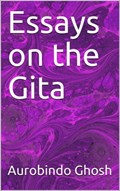THE NEED OF THE GITA
THE WORLD abounds with scriptures sacred and profane,
with revelations and half-revelations, with religions
and philosophies, sects and schools and systems. To these
the many minds of a half-ripe knowledge or no knowledge at
all attach themselves with exclusiveness and passion and will
have it that this or the other book is alone the eternal Word of
God and all others are either impostures or at best imperfectly
inspired, that this or that philosophy is the last word of the
reasoning intellect and other systems are either errors or saved
only by such partial truth in them as links them to the one
true philosophical cult. Even the discoveries of physical Science
have been elevated into a creed and in its name religion and
spirituality banned as ignorance and superstition, philosophy as
frippery and moonshine. And to these bigoted exclusions and
vain wranglings even the wise have often lent themselves, misled
by some spirit of darkness that has mingled with their light and
overshadowed it with some cloud of intellectual egoism or spiritual
pride. Mankind seems now indeed inclined to grow a little
modester and wiser; we no longer slay our fellows in the name
of God’s truth or because they have minds differently trained
or differently constituted from ours; we are less ready to curse
and revile our neighbour because he is wicked or presumptuous
enough to differ from us in opinion; we are ready even to admit
that Truth is everywhere and cannot be our sole monopoly; we
are beginning to look at other religions and philosophies for
the truth and help they contain and no longer merely in order
to damn them as false or criticise what we conceive to be their
errors. But we are still apt to declare that our truth gives us
the supreme knowledge which other religions or philosophies

